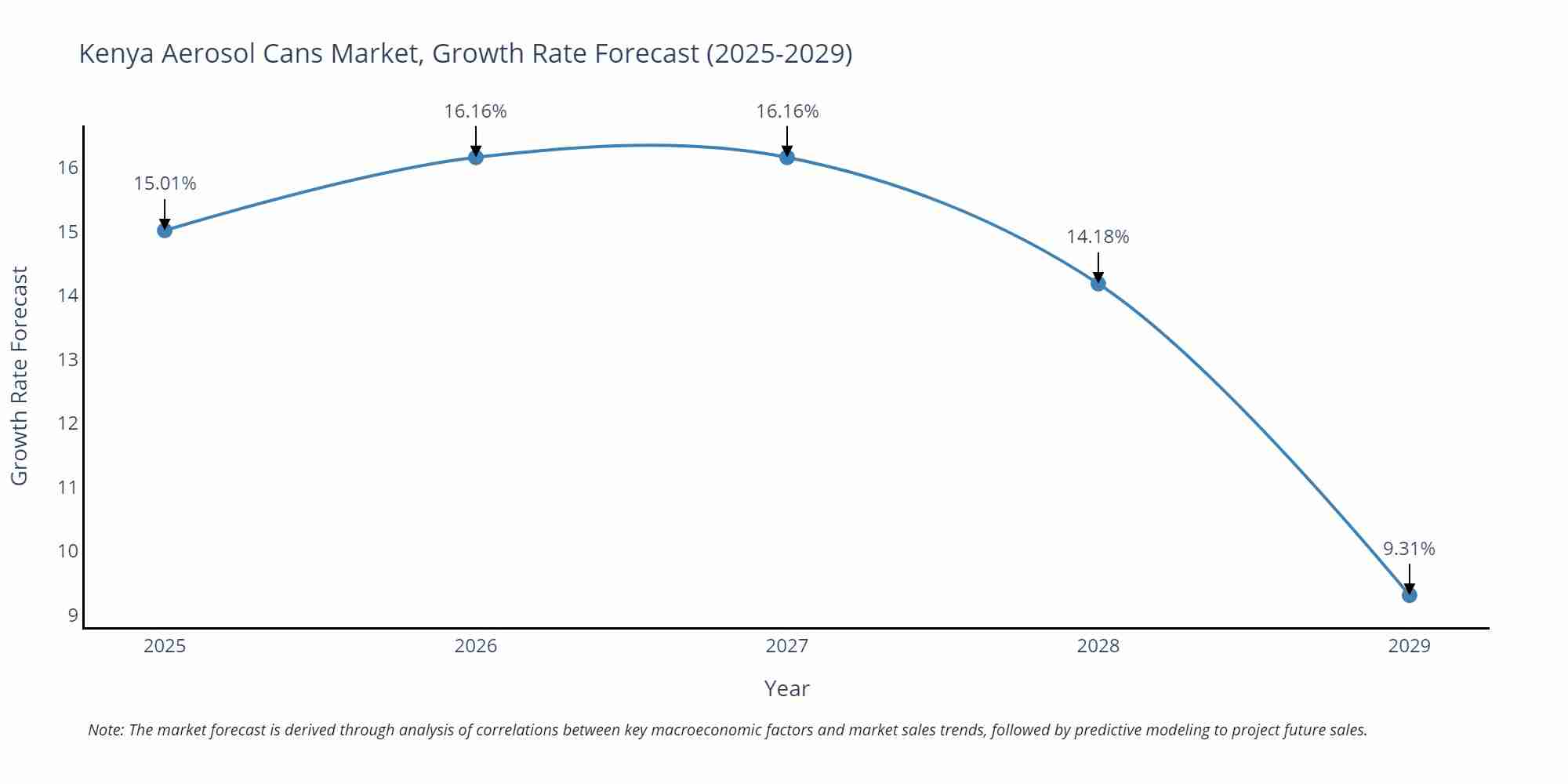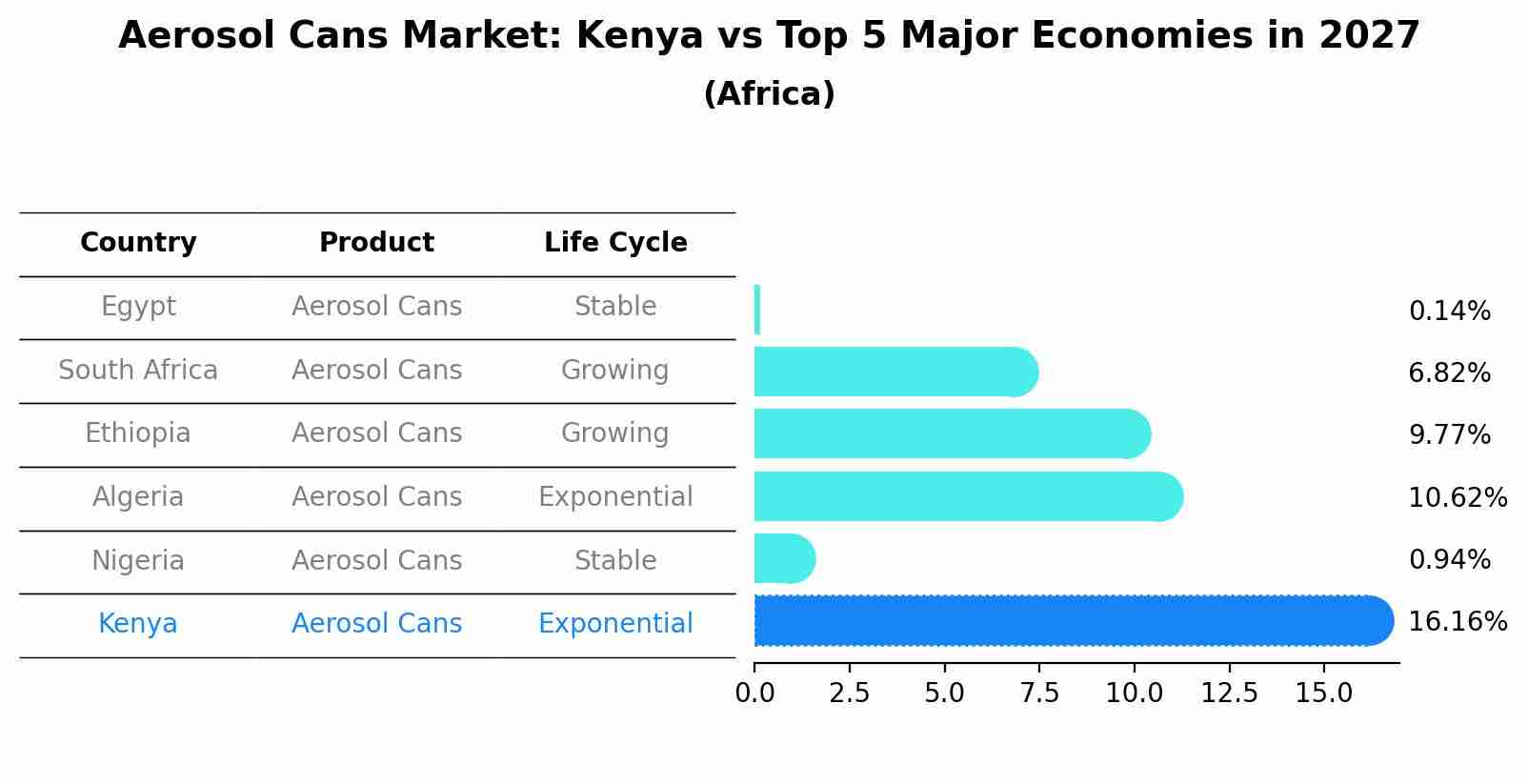Kenya Aerosol Cans Market Outlook | Size, Industry, COVID-19 IMPACT, Growth, Share, Value, Revenue, Trends, Analysis, Companies & Forecast
| Product Code: ETC374870 | Publication Date: Aug 2022 | Updated Date: Jul 2025 | Product Type: Market Research Report | |
| Publisher: 6Wresearch | Author: Ravi Bhandari | No. of Pages: 75 | No. of Figures: 35 | No. of Tables: 20 |
Kenya Aerosol Cans Market Size Growth Rate
The Kenya Aerosol Cans Market is projected to witness mixed growth rate patterns during 2025 to 2029. Growth accelerates to 16.16% in 2027, following an initial rate of 15.01%, before easing to 9.31% at the end of the period.

Aerosol Cans Market: Kenya vs Top 5 Major Economies in 2027 (Africa)
Kenya's Aerosol Cans market is anticipated to experience a exponential growth rate of 16.16% by 2027, reflecting trends observed in the largest economy Egypt, followed by South Africa, Ethiopia, Algeria and Nigeria.

Kenya Aerosol Cans Market Synopsis
The Kenya aerosol cans market is experiencing steady growth driven by increasing demand from various industries such as personal care, household products, automotive, and paints. The market is characterized by the rising popularity of aerosol products due to their convenience, ease of use, and effectiveness. Key players in the market are focusing on product innovation, sustainable packaging solutions, and expanding their product portfolios to cater to the evolving consumer preferences. Additionally, stringent regulations promoting the use of eco-friendly materials in packaging are influencing market trends. The market is competitive with both domestic and international players vying for market share, leading to a dynamic landscape with opportunities for growth and partnerships in the aerosol cans industry in Kenya.
Kenya Aerosol Cans Market Trends
The Kenya aerosol cans market is witnessing several emerging trends, including a growing demand for sustainable and eco-friendly packaging solutions. Consumers are increasingly seeking products that are recyclable and have minimal environmental impact, leading to a rise in the production and use of aerosol cans made from recycled materials. Additionally, there is a notable shift towards the use of aerosol cans in various industries such as personal care, automotive, and household products. Manufacturers are focusing on innovative packaging designs and advanced technologies to enhance product performance and meet the changing consumer preferences. The market is also experiencing a trend towards smaller-sized aerosol cans, catering to the demand for convenience and portability in product packaging. Overall, the Kenya aerosol cans market is evolving towards sustainability, innovation, and customization to meet the diverse needs of consumers.
Kenya Aerosol Cans Market Challenges
The Kenya aerosol cans market faces challenges such as fluctuating raw material prices, limited domestic production capacity, and increasing environmental regulations. Fluctuating prices of materials like aluminum, which is a key component in aerosol cans, can impact profitability and pricing strategies. Additionally, the limited domestic production capacity in Kenya may result in supply chain issues and reliance on imports, leading to potential disruptions. Moreover, as environmental concerns grow globally, stricter regulations on aerosol products and packaging waste management pose challenges for companies operating in this market. Adapting to sustainable practices and compliance with regulations while maintaining cost competitiveness are key challenges faced by players in the Kenya aerosol cans market.
Kenya Aerosol Cans Market Investment Opportunities
The Kenya aerosol cans market presents several investment opportunities due to the growing demand for convenient packaging solutions across various industries such as personal care, household products, and automotive. With an increasing focus on environmental sustainability, there is a rising demand for eco-friendly aerosol cans made from recyclable materials. Investing in research and development to innovate in this area could provide a competitive advantage. Additionally, as the Kenyan economy continues to grow, there is potential for increased consumption of aerosol products, creating opportunities for companies to expand their product offerings. Collaborating with local manufacturers to establish production facilities in Kenya could also be a strategic investment to meet the domestic demand and potentially export to neighboring markets in East Africa.
Jordan Agar Market Government Policies
The Kenyan government has implemented various policies related to the aerosol cans market to ensure compliance with environmental standards and consumer safety. The Kenya Bureau of Standards (KEBS) has set regulations for the quality and safety of aerosol cans, including specifications for materials used, labeling requirements, and restrictions on certain chemicals. Additionally, the government has introduced waste management policies to regulate the disposal of aerosol cans, encouraging recycling and proper disposal to minimize environmental impact. Importers and manufacturers are required to adhere to these regulations to ensure the products meet the necessary standards and do not pose a risk to consumers or the environment. Overall, the government`s policies aim to promote a sustainable and safe aerosol cans market in Kenya.
Kenya Aerosol Cans Market Future Outlook
The Kenya aerosol cans market is expected to witness steady growth in the coming years driven by increasing consumer demand for convenience and efficient packaging solutions across various industries such as personal care, household products, and automotive. The market is likely to be positively influenced by a growing urban population, rising disposable incomes, and the expansion of retail infrastructure. Additionally, the shift towards eco-friendly and sustainable packaging materials is expected to drive innovation and product development in the aerosol cans market. However, challenges such as stringent regulations on aerosol products and increasing competition from alternative packaging solutions may impact the market growth to some extent. Overall, with increasing consumer awareness and evolving market dynamics, the Kenya aerosol cans market is poised for moderate growth in the foreseeable future.
Key Highlights of the Report:
- Kenya Aerosol Cans Market Outlook
- Market Size of Kenya Aerosol Cans Market, 2021
- Forecast of Kenya Aerosol Cans Market, 2031
- Historical Data and Forecast of Kenya Aerosol Cans Revenues & Volume for the Period 2018 - 2031
- Kenya Aerosol Cans Market Trend Evolution
- Kenya Aerosol Cans Market Drivers and Challenges
- Kenya Aerosol Cans Price Trends
- Kenya Aerosol Cans Porter's Five Forces
- Kenya Aerosol Cans Industry Life Cycle
- Historical Data and Forecast of Kenya Aerosol Cans Market Revenues & Volume By Material for the Period 2018 - 2031
- Historical Data and Forecast of Kenya Aerosol Cans Market Revenues & Volume By Aluminium for the Period 2018 - 2031
- Historical Data and Forecast of Kenya Aerosol Cans Market Revenues & Volume By Steel-Tinplate for the Period 2018 - 2031
- Historical Data and Forecast of Kenya Aerosol Cans Market Revenues & Volume By Other Materials for the Period 2018 - 2031
- Historical Data and Forecast of Kenya Aerosol Cans Market Revenues & Volume By End-user Vertical for the Period 2018 - 2031
- Historical Data and Forecast of Kenya Aerosol Cans Market Revenues & Volume By Cosmetic and Personal Care for the Period 2018 - 2031
- Historical Data and Forecast of Kenya Aerosol Cans Market Revenues & Volume By Household for the Period 2018 - 2031
- Historical Data and Forecast of Kenya Aerosol Cans Market Revenues & Volume By Pharmaceutical/Veterinary for the Period 2018 - 2031
- Historical Data and Forecast of Kenya Aerosol Cans Market Revenues & Volume By Paints & Varnishes for the Period 2018 - 2031
- Historical Data and Forecast of Kenya Aerosol Cans Market Revenues & Volume By Automotive/Industrial for the Period 2018 - 2031
- Historical Data and Forecast of Kenya Aerosol Cans Market Revenues & Volume By Other End-user Industries for the Period 2018 - 2031
- Kenya Aerosol Cans Import Export Trade Statistics
- Market Opportunity Assessment By Material
- Market Opportunity Assessment By End-user Vertical
- Kenya Aerosol Cans Top Companies Market Share
- Kenya Aerosol Cans Competitive Benchmarking By Technical and Operational Parameters
- Kenya Aerosol Cans Company Profiles
- Kenya Aerosol Cans Key Strategic Recommendations
Frequently Asked Questions About the Market Study (FAQs):
- Single User License$ 1,995
- Department License$ 2,400
- Site License$ 3,120
- Global License$ 3,795
Search
Related Reports
- ASEAN and Thailand Brain Health Supplements Market (2025-2031) | Strategy, Consumer Insights, Analysis, Investment Trends, Opportunities, Growth, Size, Share, Industry, Revenue, Segments, Value, Segmentation, Supply, Forecast, Restraints, Outlook, Competition, Drivers, Trends, Demand, Pricing Analysis, Competitive, Strategic Insights, Companies, Challenges
- ASEAN Bearings Market (2025-2031) | Strategy, Consumer Insights, Analysis, Investment Trends, Opportunities, Growth, Size, Share, Industry, Revenue, Segments, Value, Segmentation, Supply, Forecast, Restraints, Outlook, Competition, Drivers, Trends, Demand, Pricing Analysis, Competitive, Strategic Insights, Companies, Challenges
- Europe Flooring Market (2025-2031) | Outlook, Share, Industry, Trends, Forecast, Companies, Revenue, Size, Analysis, Growth & Value
- Saudi Arabia Manlift Market (2025-2031) | Outlook, Size, Growth, Trends, Companies, Industry, Revenue, Value, Share, Forecast & Analysis
- Uganda Excavator, Crane, and Wheel Loaders Market (2025-2031) | Strategy, Consumer Insights, Analysis, Investment Trends, Opportunities, Growth, Size, Share, Industry, Revenue, Segments, Value, Segmentation, Supply, Forecast, Restraints, Outlook, Competition, Drivers, Trends, Demand, Pricing Analysis, Competitive, Strategic Insights, Companies, Challenges
- Rwanda Excavator, Crane, and Wheel Loaders Market (2025-2031) | Strategy, Consumer Insights, Analysis, Investment Trends, Opportunities, Growth, Size, Share, Industry, Revenue, Segments, Value, Segmentation, Supply, Forecast, Restraints, Outlook, Competition, Drivers, Trends, Demand, Pricing Analysis, Competitive, Strategic Insights, Companies, Challenges
- Kenya Excavator, Crane, and Wheel Loaders Market (2025-2031) | Strategy, Consumer Insights, Analysis, Investment Trends, Opportunities, Growth, Size, Share, Industry, Revenue, Segments, Value, Segmentation, Supply, Forecast, Restraints, Outlook, Competition, Drivers, Trends, Demand, Pricing Analysis, Competitive, Strategic Insights, Companies, Challenges
- Angola Excavator, Crane, and Wheel Loaders Market (2025-2031) | Strategy, Consumer Insights, Analysis, Investment Trends, Opportunities, Growth, Size, Share, Industry, Revenue, Segments, Value, Segmentation, Supply, Forecast, Restraints, Outlook, Competition, Drivers, Trends, Demand, Pricing Analysis, Competitive, Strategic Insights, Companies, Challenges
- Israel Intelligent Transport System Market (2025-2031) | Strategy, Consumer Insights, Analysis, Investment Trends, Opportunities, Growth, Size, Share, Industry, Revenue, Segments, Value, Segmentation, Supply, Forecast, Restraints, Outlook, Competition, Drivers, Trends, Demand, Pricing Analysis, Competitive, Strategic Insights, Companies, Challenges
- Uganda Precast and Aggregate Market (2025-2031) | Strategy, Consumer Insights, Analysis, Investment Trends, Opportunities, Growth, Size, Share, Industry, Revenue, Segments, Value, Segmentation, Supply, Forecast, Restraints, Outlook, Competition, Drivers, Trends, Demand, Pricing Analysis, Competitive, Strategic Insights, Companies, Challenges
Industry Events and Analyst Meet
Our Clients
Whitepaper
- Middle East & Africa Commercial Security Market Click here to view more.
- Middle East & Africa Fire Safety Systems & Equipment Market Click here to view more.
- GCC Drone Market Click here to view more.
- Middle East Lighting Fixture Market Click here to view more.
- GCC Physical & Perimeter Security Market Click here to view more.
6WResearch In News
- Doha a strategic location for EV manufacturing hub: IPA Qatar
- Demand for luxury TVs surging in the GCC, says Samsung
- Empowering Growth: The Thriving Journey of Bangladesh’s Cable Industry
- Demand for luxury TVs surging in the GCC, says Samsung
- Video call with a traditional healer? Once unthinkable, it’s now common in South Africa
- Intelligent Buildings To Smooth GCC’s Path To Net Zero













